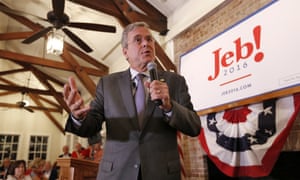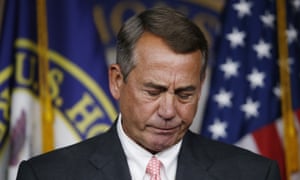Jeb Bush's 'free stuff' remark echoes Romney’s struggles with black voters
Bush argued that Republicans should offer black voters ‘a message of hope and aspiration’ but subtleties to his argument lost in the stinging reaction
Jeb Bush said a message of “hope and aspiration” rather than “division … and free stuff” could help Republicans double their share of votes among African Americans, in comments that drew comparisons with controversial remarks by Mitt Romney during his 2012 presidential campaign.
This time, Bush appeared to be making a subtly different argument than Romney – urging Republicans not to disregard African American voters and claiming many such voters wanted more substantial economic assistance. The use of the phrase “free stuff” nonetheless brought swift media opprobrium.
“Jeb Bush says Dems lure black voters with ‘free stuff’,” wrote CNN, while a commentator on MSNBC accused the Florida governor of suggesting “all you black people want is free stuff”.
According to video footage of the remarks, which were made in South Carolina on Thursday night, Bush did not mention Democrats by name or suggest this was what voters wanted. But he strayed into territory where Republicans have been accused of insensitivity in the past.
“Look around this room,” Bush was asked by a white questioner. “How many black faces do you see? How are you going to include them and get them to vote for you? Because I don’t think you are going to win without them.”
“Great question,” replied Bush, who temporarily deviated into a discussion of his use of Spanish before returning to the subject to argue his party needed to solve that problem if it wanted to win the White House:
“As it relates to African Americans, there is a way to do this. Republicans get 4% to 7% maybe of the African American vote for president. Those are kind of the numbers that I hear about.
“If you double that, you are still at a low number, but you win places like Ohio and Virginia. And we should make that case, because our message is one of hope and aspiration. It isn’t one of division and ‘Get in line’, and ‘We’ll take care of you with free stuff’. Our message is one that is uplifting, that says: ‘You can achieve earned success … we’re on your side.’”
Bush went on to argue that education reforms were an area in which he felt he could appeal to aspirations of less prosperous voters of any racial background.
“I am on the side of low-income families that are struggling and I think you can win votes doing that,” he said. “The simple fact is that our message has to be heard across the country, it can’t just be in the enclaves where people already agree with us. We don’t get to 50 unless we reach out beyond where we are today.”
The remarks bear some similarity to comments made by former Massachusetts governor Romney, when he spoke to a Republican fundraiser shortly after beingbooed for promising to abolish Obama’s healthcare initiative during a speech to the National Association for the Advancement of Colored People (NAACP).
“By the way,” Romney said, “I had the privilege of speaking today at the NAACP convention in Houston and I gave them the same speech I am giving you.
“I don’t give different speeches to different audiences all right. I gave them the same speech. When I mentioned I am going to get rid of Obamacare they weren’t happy, I didn’t get the same response. That’s OK, I want people to know what I stand for and if I don’t stand for what they want, go vote for someone else, that’s just fine.
“But I hope people understand this, your friends who like Obamacare, you remind them of this, if they want more stuff from government tell them to go vote for the other guy – more free stuff. But don’t forget nothing is really free. It has to paid for by people in the private sector creating goods and services, and if people want jobs more than they want free stuff from government, then they are going to have to get government to be smaller.”
Romney was heavily criticised for the remarks but they appear to rely on a different argument from those made by Bush this week: that Republicans shouldn’t worry about rejection by black voters and that those in favour of government initiatives like Obamacare only want free stuff.
Bush, who is trailing badly in the polls not just in the Republican primary but increasingly against likely Democratic rivals, argues this is a group he should do more to court: albeit with a similar “small government” message.
He was attacked in July by arguing it was “politically correct” to criticise Democratic candidate Martin O’Malley for saying “all lives matter” in response to the challenge of campaigners from Black Lives Matter – a criminal justice reform movement Bush was subsequently reported to have “dismissed as a slogan”.
This time, commentators suggested the former Florida governor should, at the very least, have been more careful with his language.
“How are you going to win people’s votes if your introduction to them is ‘all you folks want is free stuff’?” Eugene Robinson of the Washington Post told MSNBC in a TV discussion after the Post’s original reporting of the remarks.
“That’s ridiculous and another example of Jeb Bush’s clumsiness on the campaign trail,” Robinson added. “He was doing fine until he got to the ‘All you black people want is free stuff’ part of the sentence. That is not going to help with black voters in South Carolina [or] anywhere.”
Nonetheless, some African American activists have recently argued that presidential candidates, at least for the Democratic nomination, should focus more explicitly on economic inequality in the black community with policies that can provide direct financial assistance
Asked what tangible things SenatorBernie Sanders could do to show he is truly behind the sort of change that he touts in his racial justice platform, Brittany Packnett, an activist with the Campaign Zero campaign group, told the Guardian: “When crafting his policies, Senator Sanders can set guidelines that ensure resources go specifically and disproportionately to racially oppressed and marginalised groups.
“Invariably, this will include a focus on black people in any economic policy meant to address the wealth gap – a gap in which we sit at the bottom.
“Federal policy can incentivise communities to make systemic changes that focus on racially oppressed communities and set up formula funding to go to those of us on the racial margin in everything from healthcare to education.”






No comments:
Post a Comment
Please leave a comment-- or suggestions, particularly of topics and places you'd like to see covered